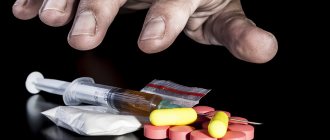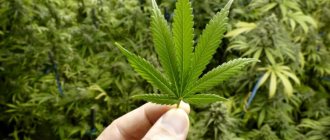Hemp turnover in the Russian Federation
Cannabis should be understood as all products obtained from the plant of the same name. These include flower tops (marijuana), compressed resin (hashish), oils, concentrated extracts (waxes), and edibles (tinctures, cookies, and even candy). If necessary, to assess the severity of the crime, the amount of the substance is calculated in laboratories after a number of special procedures, if the form of the drug does not comply with the Decree of the Government of the Russian Federation of October 1, 2012 No. 1002 (as amended on December 19, 2018).
At the beginning of July 2021, changes were made to the federal regulations responsible for cannabis in Russia - the law “On Narcotic Drugs and Psychotropic Substances”, in terms of improving the procedure for cultivating plants. According to it, the cultivation of hemp is allowed for scientific, educational and expert purposes. This may be necessary for medical and veterinary applications, as well as industry.
Cultivation will be carried out exclusively by state unitary enterprises and institutions with a license provided for by the legislation of the Russian Federation. In total, according to the Federal Drug Control Service, more than 20 varieties of hemp with a low content of alkaloids have been bred through selection. They are going to be used to create medicines or put into industry.
Approval of cannabis for medicinal purposes will be based on data from controlled clinical trials that will demonstrate quality, safety and effectiveness. In Russia, narcotic medications are prescribed by doctors of the appropriate category, and dispensed by prescription. To avoid diversion and recreational use, it is planned to keep records of persons involved in trafficking.
What are we facing for hashish?
My son, a 4th year student, was detained on suspicion of drug use. Medical examination confirmed this (smoking hashish). Everything happened for the first time. What threatens my son? Do you need a lawyer?
Dmitriy.
Your son (provided that he is prosecuted only for the use, and not for the storage or distribution of narcotic drugs) faces only administrative liability (criminal liability for the use of narcotic drugs is not provided), namely:
- Art. 6.9 of the Code of Administrative Offenses of the Russian Federation - for the use of narcotic drugs or psychotropic substances without a doctor’s prescription (fine 4 - 5 thousand rubles or administrative arrest for up to 15 days);
- part 3 art. 20.20 Code of Administrative Offenses of the Russian Federation - if the son used drugs in a public place (fine 1 - 1.5 thousand rubles).
Whether your son needs a lawyer is up to you to decide.
I OFFERED TO COOPERATE WITH THE INVESTIGATION - THEY REFUSED!
I decided to enter into a pre-trial cooperation agreement with the investigation so that the court (taking into account my behavior) would give me a lenient sentence. And he filed a petition about it. But the investigator refused and did not grant the request. Tell me, can I appeal this refusal, and if I can, then where: to the prosecutor or to the court?
tuzsem78 (via email).
The investigator's decision to refuse to satisfy a request to conclude a pre-trial agreement on cooperation can be appealed by the accused, suspect, as well as their defense attorney only to the head of the investigative body. This limitation is due to the fact that the only subject responsible for the quality of the preliminary investigation is the authorities conducting it.
HOW MANY TIMES A YEAR ARE YOU ALLOWED TO SERVE AS A JUROR?
For the second time (since January!) I was invited to participate in court as a juror. But at the beginning I was already in court for two months, I don’t want to anymore. Do I have the right to refuse?
Nadezhda Sergeevna.
Right. Because the same person cannot participate as a juror more than once in court hearings during the corresponding calendar year (Articles 4, 5 and Part 3 of Article 10; Part 3 of Article 326 of the Code of Criminal Procedure of the Russian Federation).
WHY DIDN'T THE COURT THINK ABOUT OUR CHILDREN?
The husband was convicted of robbery and has three dependent children. Two are schoolchildren (minors), the youngest is still in kindergarten. Should the court have taken this circumstance into account as a mitigating factor? Unfortunately, there is not a word about children in the verdict!
Lionara.
The presence of young children with the perpetrator is a circumstance mitigating punishment (clause “d”, part 1, article 61 of the Criminal Code of the Russian Federation). But at the same time, the presence of young children of the perpetrator cannot be regarded as a mitigating circumstance if the convict committed a crime against his child. In any case, non-recognition of circumstances as mitigating punishment must be motivated in the descriptive and motivational part of the sentence.
You can send your questions to the editorial office by mail (with a note on the envelope “Kutuzka!”) or by e-mail
Use in Russia
The incidence of hashish drug addiction in the general structure in the Russian Federation ranges from 20 to 30%. However, addiction develops only with regular use in only 9%. The substance is considered to have low addiction potential and relative safety with occasional use.
In almost every major city in Russia you can find a grower, dealer or smoker of hemp products. On the one hand, it is prohibited, on the other hand, getting it is not particularly difficult. Varieties and quality vary depending on the manufacturer. Plants may contain different amounts of cannabinoids in regions, but there are several places that have long been known for their quality hashish: Krasnodar region, Buryatia, Altai Mountains, Tuva, Amur region and Volga region, as well as the Far East.
News
September 16, 2015
Punishments provided for storage, use, etc. hemp and its derivatives in Russia
Punishments provided for the use and possession of cannabis and its derivatives by the Administrative Code of the Russian Federation
Article 6.8. Illegal trafficking of narcotic drugs, psychotropic substances or their analogues and illegal acquisition, storage, transportation of plants containing narcotic drugs or psychotropic substances, or their parts containing narcotic drugs or psychotropic substances (as amended by Federal Laws of December 8, 2003 N 161-FZ , dated May 19, 2010 N 87-FZ)
1. Illegal acquisition, storage, transportation, production, processing without the purpose of selling narcotic drugs , psychotropic substances or their analogues, as well as illegal acquisition, storage, transportation without the purpose of selling plants containing narcotic drugs or psychotropic substances, or their parts containing narcotic drugs drugs or psychotropic substances - (as amended by Federal Laws dated 08.12.2003 N 161-FZ, dated 19.05.2010 N 87-FZ) entail the imposition of an administrative fine in the amount of four thousand to five thousand rubles or administrative arrest for a term of up to fifteen days. (as amended by Federal Laws dated December 8, 2003 N 161-FZ, dated June 22, 2007 N 116-FZ, dated May 19, 2010 N 87-FZ, dated December 28, 2010 N 417-FZ)
2. The same actions committed by a foreign citizen or a stateless person shall entail the imposition of an administrative fine in the amount of four thousand to five thousand rubles with administrative deportation from the Russian Federation, or administrative arrest for a term of up to fifteen days with administrative deportation from the Russian Federation. . (Part 2 introduced by Federal Law dated December 28, 2010 N 417-FZ)
Note. A person who voluntarily handed over narcotic drugs, psychotropic substances, their analogues or plants containing narcotic drugs or psychotropic substances, or parts thereof containing narcotic drugs or psychotropic substances, acquired without the purpose of sale, shall be exempt from administrative liability for this administrative offense. (as amended by Federal Law dated May 19, 2010 N 87-FZ)
Article 6.9. Consumption of narcotic drugs or psychotropic substances without a doctor’s prescription
1. Consumption of narcotic drugs or psychotropic substances without a doctor’s prescription, except for the cases provided for in Part 3 of Article 20.20, Article 20.22 of this Code - (as amended by Federal Law of December 5, 2005 N 156-FZ) entails the imposition of an administrative fine in the amount of four thousand to five thousand rubles or administrative arrest for up to fifteen days. (as amended by Federal Laws dated June 22, 2007 N 116-FZ, dated December 28, 2010 N 417-FZ)
2. The same action committed by a foreign citizen or a stateless person shall entail the imposition of an administrative fine in the amount of four thousand to five thousand rubles with administrative deportation from the Russian Federation, or administrative arrest for a term of up to fifteen days with administrative deportation from the Russian Federation. . (Part 2 introduced by Federal Law dated December 28, 2010 N 417-FZ)
Note. A person who voluntarily applies to a medical institution for treatment in connection with the consumption of narcotic drugs or psychotropic substances without a doctor’s prescription is exempt from administrative liability for this offense. A person duly recognized as a drug addict may, with his consent, be sent for medical and social rehabilitation to a treatment and prevention institution and, in this regard, be exempted from administrative liability for committing offenses related to the consumption of narcotic drugs or psychotropic substances.
Punishments provided for the use and possession of cannabis and its derivatives by the Criminal Code of the Russian Federation
Article 228 . Illegal acquisition, storage, transportation, production, processing of narcotic drugs, psychotropic substances or their analogues, as well as illegal acquisition, storage, transportation of plants containing narcotic drugs or psychotropic substances, or their parts containing narcotic drugs or psychotropic substances (as amended by Federal Law of May 19, 2010 N 87-FZ)
1. Illegal acquisition, storage, transportation, production, processing without the purpose of selling narcotic drugs, psychotropic substances or their analogues in a significant amount (Hashish (anasha, cannabis resin) significant size - over 2 grams ), as well as illegal acquisition, storage, transportation without the purpose of selling plants containing narcotic drugs or psychotropic substances, or their parts containing narcotic drugs or psychotropic substances, in a significant amount (hemp - 6 grams ) - punishable by a fine in the amount of up to forty thousand rubles or in the amount of the wages or other income of the convicted person for a period of up to three months, or by compulsory labor for a term of up to four hundred eighty hours, or by correctional labor for a term of up to two years, or by restriction of liberty for a term of up to three years, or by imprisonment for the same term.
2. The same acts committed on a large scale ( hashish - over 25 grams, plants - over 100 grams ) - are punishable by imprisonment for a term of three to ten years with a fine of up to five hundred thousand rubles or in the amount of wages or other income of the convicted person for a period of up to three years or without it and with restriction of freedom for a period of up to one year or without it.
3. The same acts committed on an especially large scale ( hashish - over 10,000 grams, plants - over 100,000 grams ) - are punishable by imprisonment for a term of ten to fifteen years with a fine of up to five hundred thousand rubles or in the amount of wages or other income of the convicted person for a period of up to three years or without it and with restriction of freedom for a period of up to one and a half years or without it.
Note. Significant, large and especially large sizes for plants containing narcotic drugs or psychotropic substances, or their parts containing narcotic drugs or psychotropic substances, for the purposes of this article, articles 228.1, 229, 229.1 of this Code are approved by the Government of the Russian Federation.
As of November 23, 2013 , according to information on the ConsultantPlus website: for Hashish (anasha, cannabis resin) significant size - over 2 grams, large - over 25 grams, especially large - over 10,000 grams, and for hemp (plant of the genus Cannabis) significant - over 6 grams, large – over 100 grams, especially large – 100,000 grams. ) The quantity is determined after drying to constant weight at a temperature of +110 ... +115 degrees Celsius.)
Article 228.1. Illegal production, sale or shipment of narcotic drugs, psychotropic substances or their analogues, as well as illegal sale or shipment of plants containing narcotic drugs or psychotropic substances, or their parts containing narcotic drugs or psychotropic substances
1. Illegal production, sale or shipment of narcotic drugs, psychotropic substances or their analogues, as well as illegal sale or shipment of plants containing narcotic drugs or psychotropic substances, or their parts containing narcotic drugs or psychotropic substances, are punishable by imprisonment for a term of from four to eight years with or without restriction of freedom for up to one year.
2. Sale of narcotic drugs, psychotropic substances or their analogues, committed:
a) in a pre-trial detention center, correctional institution, administrative building, administrative structure, educational organization, at sports facilities, railway, air, sea, inland water transport or subway, in public transport or premises used for entertainment or leisure; b) using the media or electronic or information and telecommunication networks (including the Internet), -
- shall be punishable by imprisonment for a term of five to twelve years with a fine in the amount of up to five hundred thousand rubles or in the amount of the wages or other income of the convicted person for a period of up to three years, or without it, and with or without restriction of freedom for a term of up to one year.
3. Acts provided for in parts one or two of this article, committed:
a) by a group of persons by prior conspiracy; b) in a significant amount, -
- shall be punishable by imprisonment for a term of eight to fifteen years with a fine in the amount of up to five hundred thousand rubles or in the amount of the wages or other income of the convicted person for a period of up to three years, or without it, and with or without restriction of freedom for a term of up to two years.
4. Acts provided for in parts one, two or three of this article, committed:
a) an organized group; b) by a person using his official position; c ) by a person who has reached the age of eighteen, in relation to a minor; d) on a large scale, -
- punishable by imprisonment for a term of ten to twenty years with deprivation of the right to hold certain positions or engage in certain activities for a period of up to twenty years or without it and with a fine in the amount of up to one million rubles or in the amount of the wages or other income of the convicted person for a period of up to five years or without it.
5. Acts provided for in parts one, two, three or four of this article, committed on an especially large scale, are punishable by imprisonment for a term of fifteen to twenty years with or without deprivation of the right to hold certain positions or engage in certain activities for a term of up to twenty years. and with a fine in the amount of up to one million rubles or in the amount of wages or other income of the convicted person for a period of up to five years or without it or life imprisonment.
Article 231 . Illegal cultivation of plants containing narcotic drugs or psychotropic substances or their precursors (as amended by Federal Law No. 87-FZ of May 19, 2010)
1. Illegal cultivation on a large scale (Hemp (plant of the genus Cannabis) large size - from 20 plants, especially large - from 330 plants) of plants containing narcotic drugs or psychotropic substances or their precursors - (as amended by the Federal Law of May 19. 2010 N 87-FZ) is punishable by a fine in the amount of up to three hundred thousand rubles, or in the amount of the wages or other income of the convicted person for a period of up to two years, or by compulsory labor for a term of up to four hundred eighty hours, or by restriction of freedom for a term of up to two years, or by imprisonment freedom for the same period. (as amended by Federal Laws dated December 8, 2003 N 162-FZ, dated December 27, 2009 N 377-FZ, dated May 6, 2010 N 81-FZ, dated May 19, 2010 N 87-FZ, dated December 7, 2011 N 420-FZ )
2. The same acts committed:
a) by a group of persons by prior conspiracy or an organized group; b) repeatedly (lost force. - Federal Law of December 8, 2003 N 162-FZ;) c) in an especially large size (Hemp (plant of the genus Cannabis) large size - from 20 plants, especially large - from 330 plants ), - ( clause “c” as amended by Federal Law No. 87-FZ dated 19.05.2010)
- are punishable by imprisonment for a term of up to eight years, with or without restriction of freedom for a term of up to two years. (as amended by Federal Laws dated December 27, 2009 N 377-FZ, dated March 7, 2011 N 26-FZ)
Note. Large and especially large cultivation of plants containing narcotic drugs or psychotropic substances or their precursors, for the purposes of this article, are approved by the Government of the Russian Federation. (note as amended by Federal Law dated May 19, 2010 N 87-FZ)
Criminal liability for possession of marijuana
26.12.2018 (61149)
Marijuana in the Russian Federation is included in the list of prohibited substances No. 1, completely withdrawn from civil circulation. The penalty for marijuana possession depends on the amount of weed found by law enforcement and the purpose for purchasing or manufacturing it. Possession of any narcotic drug for the purpose of sale, in accordance with the law, is punished more severely than for personal use. If the weed is intended for personal use and is found in small quantities, the culprit faces administrative liability - a fine or administrative arrest. Criminal liability for possession of marijuana purchased for personal use begins with a significant amount (6 g).
What is marijuana and its effect on the body
Marijuana is a drug obtained from the stems and leaves of cannabis with the addition of a small amount of flowers. The active substance is THC, which is found in marijuana at 0.5-4%.
Addicts sometimes add marijuana to food for an intoxicating effect, but the main way to use it is through smoking. For this purpose, a rolled-up cigarette (joint) or a cigarette is used, in which tobacco is replaced with weed. Inhaled smoke containing THC enters the bloodstream through the lungs and spreads throughout the body, resulting in drug intoxication.
The active substance of marijuana, after entering the bloodstream, begins to act almost immediately, the maximum effect is achieved after half an hour, and the duration of action is 2-4 hours, depending on the concentration of THC and the sensitivity of the body.
Characteristic features of cannabinoid drug effects:
- euphoria;
- general muscle relaxation, feeling of lightness;
— violation of spatiotemporal perception;
- unreasonable uncontrollable laughter;
- hyperesthesia of sound, color and taste stimuli.
In a state of drug intoxication after consuming marijuana, the perception of things changes: colors become brighter, individual sounds merge into music, food becomes even tastier, etc. The passage of time slows down or, on the contrary, accelerates, social activity increases - a person becomes sociable and talkative.
In combination with alcohol, a feeling of impending danger may appear, anxiety and panic may arise. General lethargy appears, thought processes and memory are disrupted.
Effect of marijuana on human organs:
- brain - has a negative impact on short-term memory, the ability to understand what is happening, abstract thinking and learning;
- lungs - causes the negative effects characteristic of tobacco smoking, on an increased scale - pharyngitis, bronchitis, sinusitis, cancer, edema, the development of various diseases of the upper respiratory tract.
- heart - increased blood pressure, increased heart rate;
- reproductive system - hormonal imbalance, decreased testosterone and increased number of abnormal cells in sperm in men, ovulation disorders and toxic effects on the fetus in women.
Marijuana can accumulate in the female genital organs and disrupt the development of the fetus; mothers who smoke marijuana give birth to children with reduced weight - “fetal marijuana syndrome,” which is observed 5 times more often than “fetal alcohol syndrome.” When feeding infants, the drug passes through the mother's milk into the child's body. Weed can cause unpredictable effects in people with heart defects and those suffering from cardiovascular diseases.
Marijuana impairs coordination of movements; after smoking “weed,” the reaction to sound and light signals slows down, the degree of perception and the ability to perform sequential operations decreases. The drug addict develops a need to actively move and talk, and when at rest they take unnatural positions.
Marijuana acts more mildly than hard drugs, but ultimately causes the same consequences - destruction of health and personality degradation. The consequences of drug use can be mental disorders - apathy, depression, suicidal tendencies. In the absence of weed, a state of extreme discomfort appears, which forces you to constantly increase the dose.
Marijuana leads to rapid addiction, and then to the need to increase the dose, followed by a transition to stronger drugs. Medical studies show that in almost all cases, users of heroin, crack and other “hard” drugs started with marijuana. Cannabis and all drugs based on it are included in List No. 1 of the UN Convention and relevant legislative acts of the Russian Federation and are prohibited from free circulation.
Long-term use of marijuana leads to serious disruptions in the functioning of the brain and vital systems in humans. The only positive effect of marijuana is that by blocking pain receptors, it can provide a powerful analgesic effect.
Punishment for possession of marijuana
Possession of marijuana means the very fact that it is in the possession of a certain person. In this case, the storage location and duration do not matter. The drug can be seized from the offender’s home, car interior, bag, clothing pockets, etc.
If detected, a medical examination of the detainee is carried out; the presence of the drug in the blood is automatically equated to the use of marijuana and entails administrative punishment with subsequent registration at a drug treatment clinic. If more than 6 g of marijuana (a significant amount) is detected, a criminal case is opened under Art. 228 - illegal possession, use and transfer of psychotropic and narcotic drugs without the purpose of sale. If it is established that the culprit in one way or another participated in the distribution of marijuana, he faces a criminal case under Article 228.1. Inducing other people to use marijuana in any form is Article 230 of the Criminal Code of the Russian Federation.
Cultivation of hemp is also a crime; for growing a small number of plants, you face administrative liability, and for finding more than 20 plants on your personal property, there is a criminal penalty.
Liability for possession of marijuana is determined by a number of articles of the Criminal Code and depends on the specific situation and the totality of mitigating and aggravating circumstances (if any).
The punishment can be mitigated by voluntary surrender of weed, a certificate of health problems, or positive references at the place of work or residence. Mitigating circumstances during a criminal investigation also include the presence of dependent young children and some other factors.
Articles for possession of marijuana
Marijuana is one of the most common drugs used through smoking. The use of weed falls under Article 6.9 of the Administrative Code, which provides for punishment in the form of a fine in the amount of 4-5 thousand rubles or 15 days of administrative arrest. The statute of limitations for the offense is 1 year; if a foreigner is caught with “weed,” he will be expelled from Russia. Parents are responsible for a child caught with marijuana (Article 20.22 of the Criminal Code of the Russian Federation). An additional hassle of being caught with drugs is registration at a drug treatment clinic. A person is released from administrative liability for possession of marijuana if he voluntarily surrenders the “weed” in his possession and goes to a medical institution for treatment for drug addiction.
Upon possession of marijuana on a large or especially large scale, a criminal case is initiated in accordance with Art. 228 of the Criminal Code of the Russian Federation.
Article 228 provides for liability for illegal transactions with narcotic and psychotropic drugs, their analogues and plants containing psychotropic and narcotic drugs. At the legislative level, the acquisition, storage, processing and transportation of narcotic drugs is prohibited.
Article 228, part 1 for possession of marijuana in a significant amount provides for liability: a fine of up to 40 thousand rubles or in the amount of the offender’s income for a period of up to 3 months, correctional labor for up to two years, up to three years of imprisonment and up to 480 hours of compulsory labor.
If marijuana is found in large quantities, in accordance with Art. 228, part 2, the perpetrator faces imprisonment for a term of 3 to 10 years, with restriction of freedom for a period of up to 1 year or without it, with a fine of up to 500 thousand rubles or in the amount of the income of the convicted person for a period of up to three years or without it.
The punishment for possession of “grass” on an especially large scale is imprisonment for a term of 10-15 years with or without a fine of up to 500 thousand rubles, with or without restriction of freedom for a term of up to 1.5 years.
The note to the article for possession of grass (Article 228 of the Criminal Code of the Russian Federation) discusses the conditions for releasing the guilty person from liability. The perpetrator may be released from criminal liability if all the conditions are simultaneously met:
— there was a voluntary surrender of the drug;
— providing assistance to law enforcement agencies in solving and preventing crimes in the field of drug trafficking, exposing persons who have committed or are committing a crime;
— assistance in detecting funds obtained by criminal means.
It is considered that voluntary surrender of drugs has occurred if their owner transferred prohibited drugs to law enforcement agencies when he had the opportunity to dispose of the drug differently. If the marijuana was seized during arrest or during the investigation, then the voluntary surrender will not be counted by the court.
Large and especially large sizes of narcotic drugs are established by the Government of the Russian Federation.
Administration of the city of Oboyan





